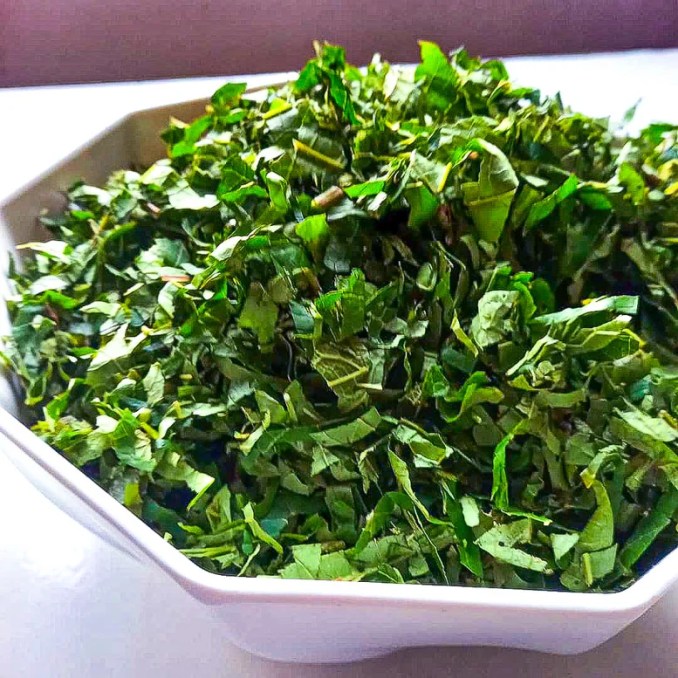
Ugu, sometimes spelled as ugwu, is a highly nutritious leafy vegetable.
It is a staple in soups, stews, and porridges and is valued for its nutritional richness.

What is Ugu?
Ugu, also known as fluted pumpkin leaves (Telfairia occidentalis), is a plant native to West Africa.
It is grown for both its seeds and leaves.
While the seeds are used to make oil or consumed as snacks, the leaves are widely popular in traditional cooking in Nigerian and West African cuisines.
The word “Ugu” has its roots in the Igbo language, a prominent dialect spoken by the Igbo people of Nigeria.

How Is It Used?
Ugu can be prepared in various ways. It is a key ingredient in dishes like Egusi Soup and Ogbono Soup.
Also, when making Efo Riro soup, if you do not have shoko leaf, you can use ugu leaves as substitutes.
It can also be added to vegetable stir fries, yam porridge (Asaro), smoothies and juices, and herbal remedies.
How to Prepare Ugu
The first step is to clean the leaves. Begin by washing the leaves thoroughly to remove dirt and grit.
Next, depending on your preference for cooking and the dish you are making, you would need to chop the leaves either finely or roughly.
Finally, add the chopped leaves to soups or stews. It’s important to wait for the final minutes of cooking so that you do not overcook this vegetable.
If you add it too early or overcook the leaves, you will notice that it loses its green color. The leaves will also lose their nutritional value.

Does It Have Any Health Benefits?
Ugu is often celebrated for its potential health benefits due to its nutrient content.
It is believed to be rich in iron, which may support the production of red blood cells and help prevent anemia.
With vitamins A, C, and E, ugu could boost immunity, improve skin health, and support vision. Its calcium and magnesium content may contribute to strong bones and teeth.
Additionally, the dietary fiber in ugu is thought to aid digestion and help regulate blood sugar levels, while its antioxidants might protect cells and reduce inflammation.
Can Ugu Be Grown at Home?
Yes, it can be grown at home with proper care. It thrives in warm climates and is easy to cultivate:
- Planting: Sow the seeds directly in well-drained soil.
- Watering: Keep the soil consistently moist but not waterlogged.
- Support: This plant needs to climb so, provide a trellis or stake for the vines to climb.
- Harvesting: Start harvesting the leaves 4–6 weeks after planting and continue regularly to encourage new growth.
How Do I Store This Vegetable?
When it is fresh, wrap it in a damp paper towel and store in the refrigerator for up to 3–5 days.
If you have already cooked it, refrigerate in an airtight container for up to 2–3 days. Eating it within those days is a good idea, discard if you are unable to do so.
For an extended use, you can cook the leaves partially and then freeze them (blanch) in a sealed container for up to 3 months.

Does Ugu Expire?
Yes, its can spoil if not stored properly.
It is very easy to tell when they have gone bad by the way their leaves look and smell. Once they are wilted, slimy and have an unpleasant odor, it’s time to purchase new leaves.
What Can I Use Instead of Ugu?
If you can’t find ugu leaves, there are a few substitutes to consider.
Spinach is a mild-flavored option that works well in soups and stews. Kale offers a slightly bitter taste and firm texture, making it a suitable replacement.
Collard greens, with their similar texture and flavor to ugu, also work beautifully in many traditional dishes.



Is Ugu the Same as Ugwu Leaf?
Yes, they both refer to the same thing.
“Ugwu” is how it is often pronounced in spoken Nigerian Pidgin while “Ugu” is the spelling you might see in written forms.




Be the first to comment